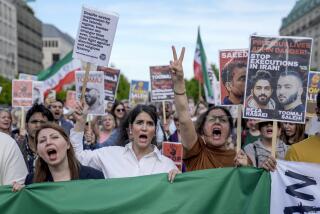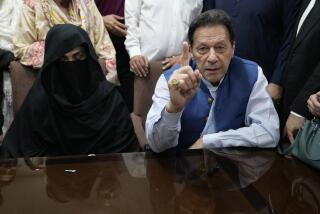British Mogul on Death Row Gets Life Term
- Share via
MIAMI — Krishna Maharaj made a fortune importing bananas and once owned two dozen Rolls-Royces and the second-largest string of racehorses in Britain. He was a fixture of England’s horsy set, and one of his thoroughbreds beat out Queen Elizabeth II’s own entry at Ascot.
These days, the 63-year-old British subject of West Indian heritage wears prison blues and is inmate No. 109722 in Florida’s prison system. Convicted of a double murder, he has been fighting to hang on to what remains of his life.
On Wednesday, a Miami jury gave him what he had been seeking: a reprieve from death in the electric chair, and a life sentence in a cell instead.
Scores of members of Parliament and a considerable chunk of the British establishment had taken up Maharaj’s cause in the latest dispute over the death penalty to set the United States against one of its European allies--in this case, its closest ally.
The last Briton was sent to the gallows 40 years ago, and hangings were abolished in that country in ’98.
“The British government is anti-death penalty in all cases,” said British Deputy Consul General Stephen Collier, who attended court proceedings for Maharaj in Miami. “We’ll do everything we can in this and any case to make sure the death penalty is not carried out.”
Earlier this month, a Georgia pardons board rebuffed pleas from British officials, including Prime Minister Tony Blair, and denied clemency to a Briton who had been on the state’s death row for 16 years. On March 12, Tracy L. Housel, 43, who had been convicted of raping and killing a woman he met at a truck stop north of Atlanta, was executed by lethal injection.
France, another major American ally in Europe that halted executions in 1981, has alerted the United States that if Zacarias Moussaoui, one of its nationals accused of being an accomplice of the Sept. 11 hijackers, is charged with a crime that carries the death sentence, French authorities will provide no evidence that might lead to a conviction on that count.
The Justice Department is expected to announce, as early as today, whether the U.S. government will seek the death penalty against Moussaoui.
In the Maharaj case, a Florida court found him guilty in 1987 of shooting to death a business partner and the man’s son in a downtown Miami hotel, and sentenced him to death in the son’s murder.
Maharaj spent a decade and a half on Florida’s death row, until the state’s Supreme Court tossed out the death sentence because of procedural irregularities, and paved the way for a resentencing hearing.
The original trial was hardly a picture-perfect example of justice. The judge was led away in handcuffs on charges of accepting bribes in another case. With another judge brought in, the case against Maharaj went forward uninterrupted.
Prosecutors say that the physical evidence implicating Maharaj in the murders is overwhelming, and that he gunned down Duane Moo Young, 23, after reassuring the young man within earshot of a witness that he would not harm him. Maharaj, in a separate federal appeal, has claimed he was not even in Miami when the murders occurred.
No fewer than 293 British parliamentarians petitioned Florida’s Supreme Court to have Maharaj freed, and the case was featured in a BBC-TV documentary. On Monday, in the fourth-floor Miami courtroom where the resentencing hearing was held, some prominent Britons testified on Maharaj’s behalf by satellite hookup.
Peter Bottomley, a former Conservative Cabinet member, called Maharaj “the kind of person I’m pleased to be associated with.” Clive Brittain, a horse trainer, said Maharaj gave him a generous leg up at the onset of his career by sending him two fillies to train.
Clive Stafford-Smith, a British-born attorney who crusades against the death penalty in the United States, was present to participate in Maharaj’s defense. “I’m utterly convinced he’s innocent,” Stafford-Smith said. For him, the issue is as much personal as legal--the attorney has known Maharaj for decades, and Stafford-Smith’s father sold the fruit dealer two horses in the 1970s.
“Why do we want to kill Kris Maharaj?” Stafford-Smith said. “There is much good in him.”
Deputy State Atty. Sally Weintrab, in closing remarks to the jury, painted a different portrait of the man who attended the hearing wearing a black, white and gray pullover. She claimed Maharaj lured Derrick Moo Young, 53, and his son into a trap with homicide on his mind.
“This was a murder by appointment,” Weintrab said. “He was shrewd, canny and quick.”
At the original trial, Maharaj was sentenced to 25 years to life imprisonment for the slaying of the elder Moo Young. According to news reports, the partners had a falling out over a property deal gone bad in which Maharaj believed he was bilked by Moo Young of more than $600,000. His holdings had already been significantly trimmed by the British property crash of the 1970s.
In Florida, a jury in a capital case can either recommend the death penalty or life imprisonment. The 12 men and women impaneled to consider Maharaj’s fate deliberated over two days, then recommended a life term. Miami-Dade Circuit Judge Jerald Bagley, who presided over the hearing, accepted the jury’s advice and promptly handed down a life sentence.
Because of the double-murder convictions and consecutive minimum sentence requirements, Maharaj must serve 50 years in prison before being eligible for parole, Ed Griffith, a spokesman for the Miami state attorney’s office, said.
After the jury’s decision was known, Griffith lashed out at the British press, saying they had been so biased in their coverage of the case that they unjustifiably defamed Maharaj’s victims by labeling them narcotic dealers.
Stafford-Smith said the new sentence was a definite improvement, but vowed to press on with motions to have the guilty verdicts against Maharaj thrown out entirely.
“I’m glad to get this far, but we still have a ways to go,” the defense attorney said. “We’re going to federal court” today.
Though Maharaj claims he was framed for what he says was a drug-related hit, Bagley refused to allow anyone who testified to cast doubt on the validity of the nobskeguilty verdicts themselves. Stafford-Smith called it an outrage that a man fighting for his life was not permitted to produce proof of his innocence.
Ironically, Maharaj’s younger brother, Ramesh, rose to be attorney general of their native Trinidad and Tobago, where he was the Caribbean’s most vocal advocate of the death penalty.
More to Read
Sign up for Essential California
The most important California stories and recommendations in your inbox every morning.
You may occasionally receive promotional content from the Los Angeles Times.













